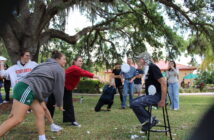By Hadassa Ferreira, Arts & Culture Editor
There’s nothing better to warm our hearts at the end of the year than the holidays. One of the most important and widely celebrated is Thanksgiving, which falls on Thursday, Nov. 28.
Thanksgiving is a time that people look forward to all year, knowing it’s an opportunity to spend quality time with loved ones while celebrating and giving thanks for the blessings we’ve received throughout the year. Whether it’s for family, friends, health, or success, Thanksgiving serves as a reminder to appreciate the things that make life meaningful.
Today, Thanksgiving is such a common and expected celebration that people often focus more on the festivities with family and friends, forgetting to consider the rich history behind the holiday and how it became celebrated in the United States.
According to History.com, two key events marked the beginning of Thanksgiving. The first dates back to 1621, when the Pilgrims of Plymouth and the Native American Wampanoag people shared a feast to celebrate the autumn harvest.

The harvest that year was significant because it marked the end of a period of great hardship for the colonists, who had struggled with cold weather, limited resources, and disease during their first year in America.
During the first winter, the Pilgrim colonists stayed aboard the Mayflower due to the lack of shelter on land, and tragically, half of the crew who had traveled from England to the United States died. According to History.com, when spring arrived, the surviving colonists met members of the Abenaki tribe, including Squanto, who taught them how to survive in the new land.
Squanto taught them to cultivate corn, extract sap from maple trees, catch fish in the rivers, and avoid poisonous plants. He also helped the colonists to forge an alliance with the Wampanoag Native people. This alliance lasted more than 50 years and proved vital to the success of the Pilgrims’ settlement in the region, ensuring their survival and prosperity in the years that followed.
Regarding the menu of the first Thanksgiving, History.com notes that it was a bit different from what we’re used to today. For meat, they ate a variety of fowl, though records don’t specify the exact type of poultry— it may or may not have been turkey— and deer. The sides likely included vegetables from that year’s harvest, such as corn.
Small colonies and states in America continued to mark the 1621 celebration for the next 200 years. However, it was not officially called Thanksgiving until the American Revolution in 1789, when George Washington issued the first Thanksgiving proclamation by the national government of the United States.
The proclamation aimed to call on Americans to express gratitude for the successful end of the country’s War of Independence and the successful ratification of the U.S. Constitution, a significant milestone in the nation’s history.

After that, several states began calling the celebration Thanksgiving, with New York being one of the first to adopt it as an official holiday in 1817. The idea gained widespread popularity, and the American people began making numerous appeals to the government to establish Thanksgiving as an official national holiday.
Finally, in the middle of the Civil War in 1863, President Abraham Lincoln declared the last Thursday of every November as National Thanksgiving Day, officially establishing the celebration cherished by Americans today.
Thanksgiving has evolved from a small, shared meal between the Pilgrims and Native Americans in 1621 to a national holiday that unites people across the United States in gratitude and celebration. As we gather together this November, it’s important to remember the rich history behind this cherished occasion and the spirit of thankfulness it represents.





